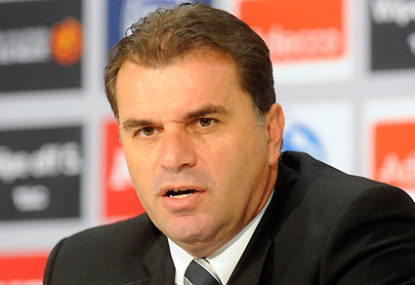An avalanche of goals but still some clean sheets to end the season: The A-League players who were the difference in Round 26
Joe Lolley was outstanding for the Sky Blues, scoring a brace as Sydney FC equaled their biggest ever victory.

With all of my live A-League experience thus far having being restricted to the Harbour City, it was with a great deal of anticipation that I travelled to Melbourne for the Victory v Heart season opener.
I enjoyed a pre-match coffee with Fox Sports’ A-League stats man David Paton, who expressed a view that is seemingly shared by many Melbourne fans – that it was a shame the game wasn’t on at AAMI Park.
“Melbourne’s got the best ground and the worst ground in the league for watching a game,” David said.
I’ll defer to the Melbourne fans on that one for the time being, but it should be noted that AAMI Park could not have held the 42,000 fans who piled into Etihad Stadium last night.
The fact that this was opening night, and the Melbourne derby to boot, was already enough to ramp up the anticipation. But there was an intrguing subtext to the match, with both teams playing under new coaches whose credentials could not have been more different.
Ange Postecoglou is the patron saint of Australian coaches, the catalyst for the Roar revolution, the local boy made good, returning to take the helm at the league’s biggest club.
Sitting on the other set of plastic chairs which make up a ‘bench’ was John Aloisi, an Australian hero due to one nerveless moment seven years ago, when the weight of 32 years of tears and heartbreak settled on his shoulders.
He delivered the penalty kick which would change the course of Australian football history. But as a coach, he has a one page resume.
Well, the game didn’t follow the script. The Heart simply did not allow the Victory to dominate possession in the way that Postecoglou’s Roar have done for the last two seasons.
Even in their defensive third, the Victory were always under pressure and were rattled by the Heart’s high line.
It was noticeable from my seat high up behind the goal at the Spencer Street Station End that, all too often, the Victory’s only method of escape was for goalkeeper Lawrence Thomas to clip a risky pass over the top of the Heart front men to either Foschini or Traore, who had taken up wide positions thirty metres up the pitch.
However, there were two periods of breathtakingly good passing from the Victory in the first half which had that trademark Roar look about them.
One of those led to the equalising goal: a quick exchange of passes down the left and an exquisite Archie Thompson cross for Marco Rojas to slot home.
That would be to deny the Heart’s endeavour and energy in the first half though, and they created more chances with their high press game and rapid switches in attack.
David Williams was unmarked to score at the far post in the 14th minute because the Victory defence had compressed too quickly to shut down a move on their left side.
It was a similar scenario for Dylan Macallister’s strike right on half-time, a goal which ultimately proved to be the match-winner.
The first half had the goals, but the second half had the stadium rocking with end-to-end action. The Heart should have put the game to bed with three clear one-on-one chances, but Victory keeper Lawrence Thomas kept his side in the match.
Archie Thompson should have buried an 89th minute opportunity which would have lifted the roof off the stadium (except it was already open) had it hit the back of the spanking new, black net.
And so for this ‘neutral’, a fantastic experience drew to a close. Great game, fantastic crowd, and that ‘big match feel’ beforehand, with the fans gathering around the shops, cafes and bars along Spencer Street.
Having attended the game with friends who are originally from Germany, they felt the atmosphere measured up pretty well to a European game.
But one of them was dumbfounded by those plastic chairs. “Why do they not have a proper bench or dugout?” he said. “They look like chairs you hire for a barbecue.”
Now maybe that’s what can make the A-League distinctively Australian. Plastic barbecue chairs.